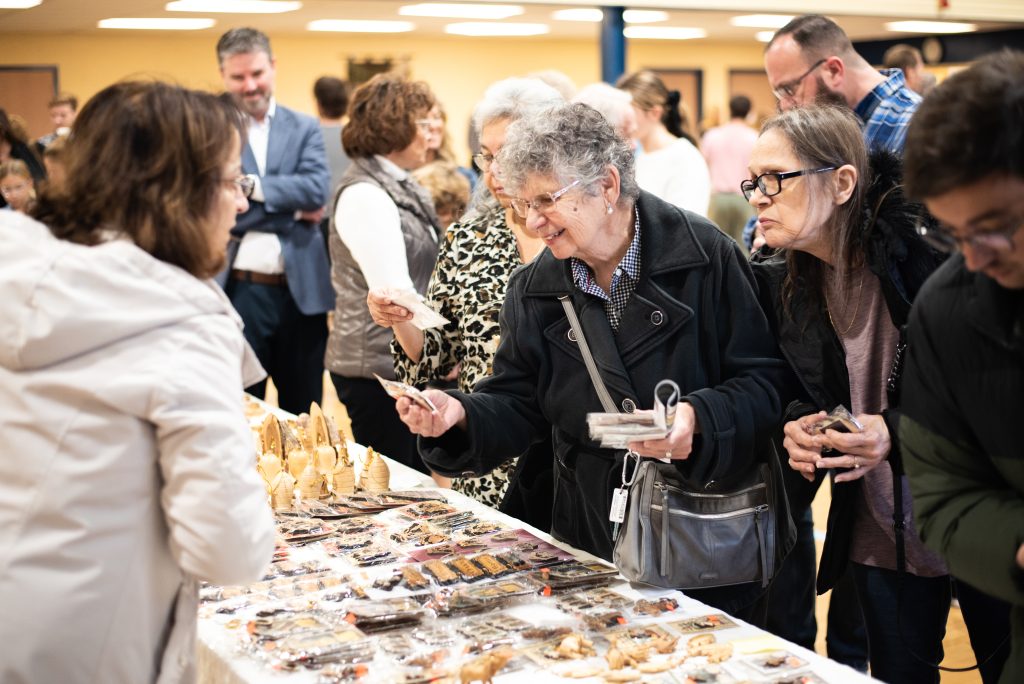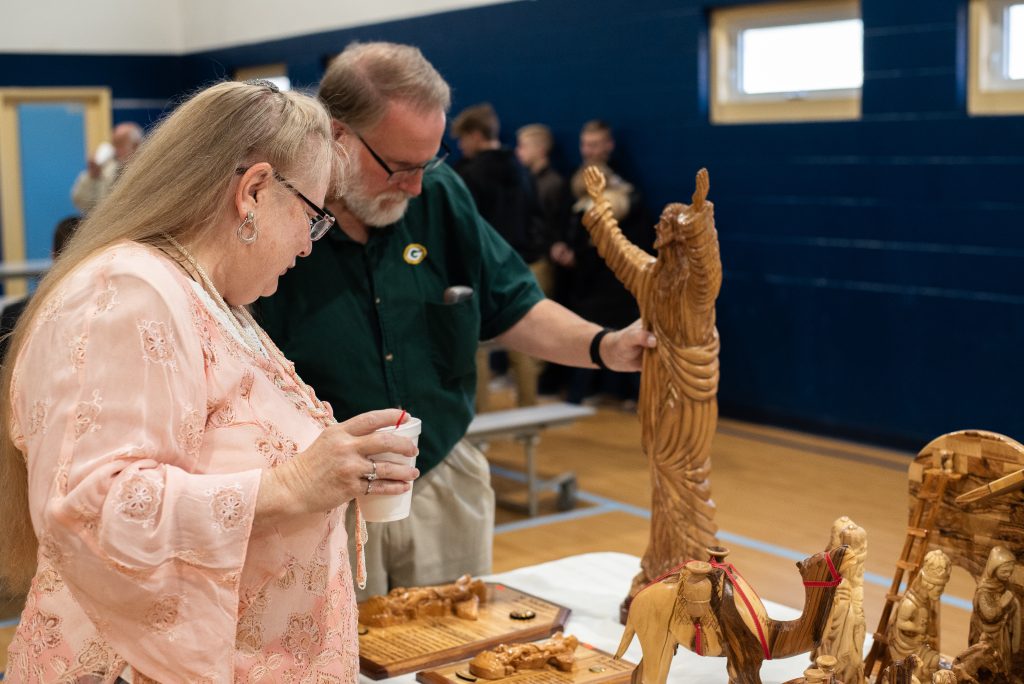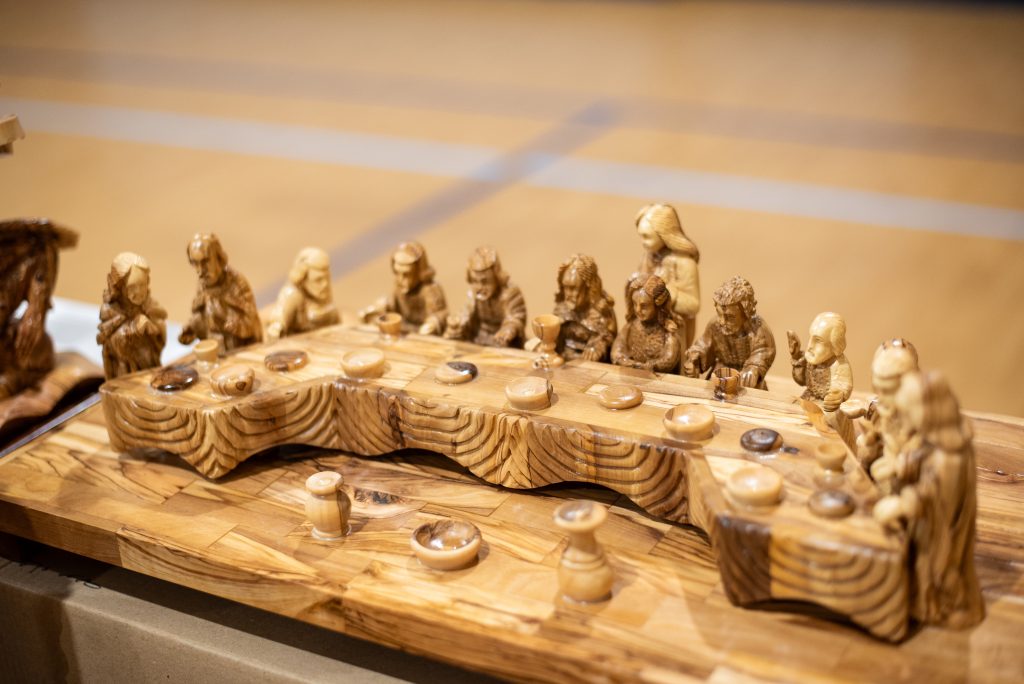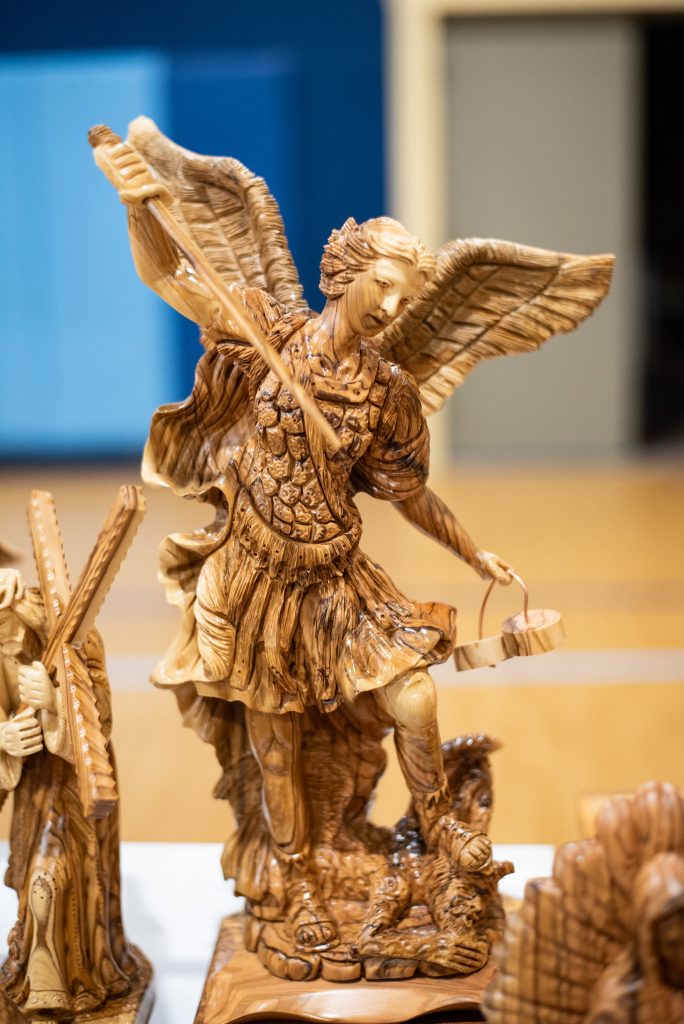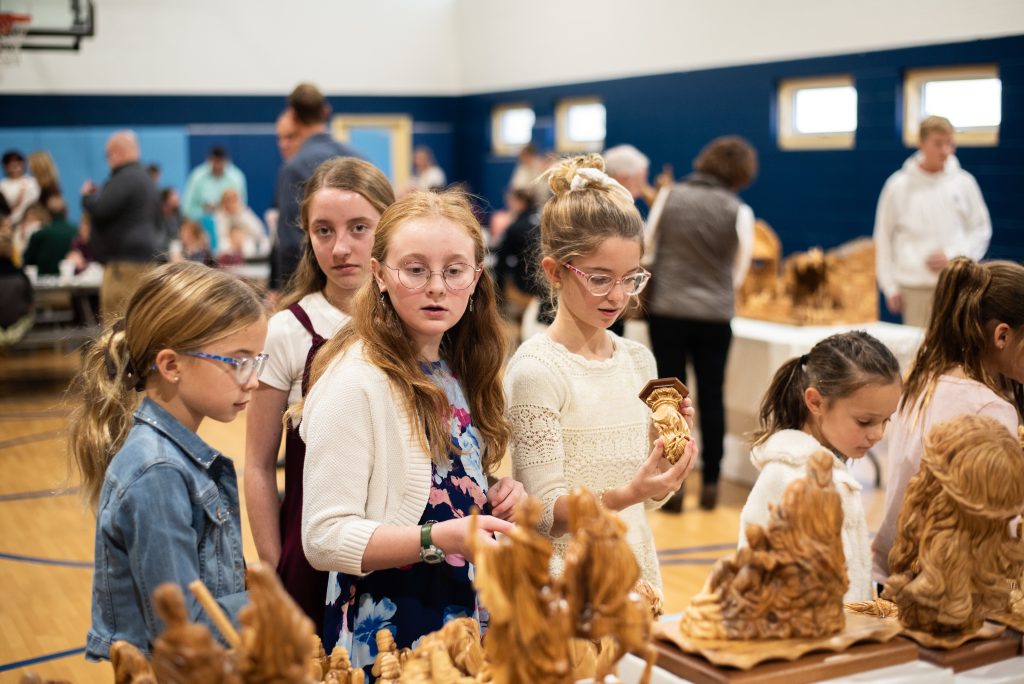November 19, 2023 // Diocese
Made in Bethlehem: Supporting Palestinian Christians in Troubled Times
No place on earth is more closely linked to Christmas than the little town of Bethlehem. In view of the ongoing war between Hamas and Israel – the images of which have filled our media for weeks – Bethlehem residents are living amid fear and uncertainty.
Because tourism is the primary industry source of income, anything that keeps pilgrims away from the Holy Land jeopardizes the livelihood of those living in Bethlehem, not to mention the scarcity of food and other resources, and the terrorism that threatens all residents of the West Bank.
While the Christian community in the Holy Land was once thriving, now, only 2 percent of those who remain in the land where Jesus lived and died are Christian. Their friends and relatives who have emigrated to North America are doing what they can to help the Christians who remain. Marketing olive wood items handcrafted in Palestine is one way they fulfill this mission.
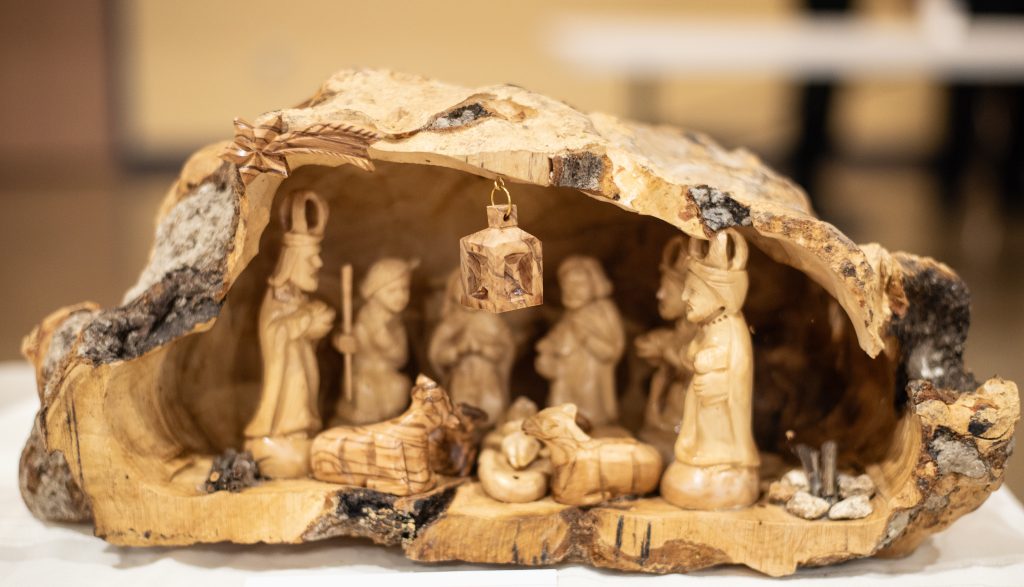
Photos by Scott Warden
A Nativity scene carved from the branch of an olive tree is displayed at Our Lady of Good Hope Church in Fort Wayne.
Although Alfred and Grace Salsa are now American citizens living in Michigan, they grew up in Bethlehem, where Alfred worked for an American company. In 2002, Nativity Artifacts Inc., an organization that sells olive wood carvings, invited Alfred to move to the United States as a way to help his homeland. The bishop of Jerusalem encouraged him to make this move as a way of supporting the Christian minority remaining in the Holy Land. Salsa views his work as a ministry, not a business. Besides setting up displays of handmade olive wood products in churches, he arranges pilgrimages to the Holy Land for groups from the Diocese of Fort Wayne-South Bend and others.
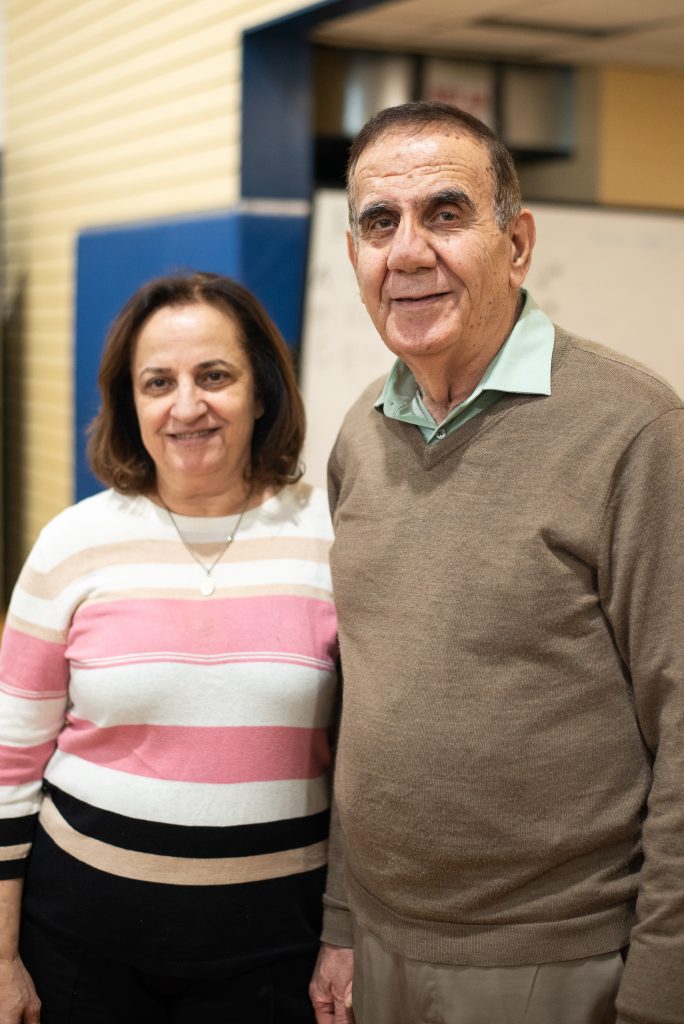
Grace and Alfred Salsa, who grew up in Bethlehem, pose for a photo on Sunday, November 5, while selling olive wood sculptures at Our Lady of Good Hope Church in Fort Wayne.
Salsa will display handmade olive wood items such as crosses, nativity sets, rosaries, and depictions of the Last Supper and the Holy Family. Eighty-five percent of the proceeds from the sales of these items go directly to the craftsmen in Bethlehem, enabling them to feed their families and remain in their traditional homeland.
On the weekend of November 4-5 the Salsas sold their products at Our Lady of Good Hope in Fort Wayne. The following weekend, November 11-12, they set up their shop at Sacred Heart Parish in Warsaw.
From now until Christmas, there are three more dates that they will be selling their olive wood sculptures in the diocese:
November 25-26 at St. Pius X in Granger.
December 2-3 at St. Vincent de Paul in Fort Wayne.
December 9-10 at St. Elizabeth Ann Seton in Fort Wayne.
Salsa is in daily contact with his family in Bethlehem. All have survived the attacks so far, he told Today’s Catholic, but they are experiencing shortages of basic food items such as flour and rice, and entry points into their territory are sealed off.
“All we can do is pray,” Salsa said. “At this point, we don’t know what the future holds, and we can’t see a peaceful resolution. Please join us in praying especially for Christians in the Holy Land. We are so sad as we watch innocent people dying on both sides. Politicians around the world need to step up and do what they can to stop the killing!”
Joseph Shomali, based in Montreal, was also born near Bethlehem. He descended from the shepherds who were the first to learn of the Messiah’s birth. One of his brothers, William Shomali, is an auxiliary bishop in the Latin Patriarchate of Jerusalem, which has responsibility for Christians in Gaza. Because higher education was unavailable to Palestinians in Israel, Joseph began studying chemical engineering in Baghdad and completed his education in Canada, where he worked in that field. However, during a 1991 visit to his family in Bethlehem, they begged for his help in promoting their handcrafted items.
“In our culture,” Shomali said, “when someone asks for your help, you don’t say no. You say, ‘We will try.’” For the next four years, he ran a shoestring operation out of his basement. As it expanded, he decided he needed to resign from his engineering career and devote himself fulltime to that business. “When the Lord gives you a mission and you accept your vocation, you will be blessed,” he said.
The business evolved in response to customer demand on the one hand and developments in the Catholic Church on the other. Although the olive wood still comes from the Holy Land, Canadian materials like metal to form the corpus on the crucifix had to be added. Quality was important to Shomali. When he talked with bookstore owners, they were reluctant to stock his products because of their experience with Israeli companies that charged high prices for shoddy items. It didn’t take them long to appreciate his lower prices and superior quality – and the fact that about 50 percent of the price goes back to the craftsmen in Palestine. EWTN was also instrumental in making Shomali’s offerings known.
“There is a big difference between people living in faith and those concerned about their bottom line,” Shomali said.
Because of television and online marketing, Shomali was able to thrive during the COVID-19 pandemic. Craftsmen working with their own families in the Holy Land didn’t have to cease production in times of lockdown.
Shomali and his wife are a knight and lady of the Equestrian Order of the Holy Sepulchre of Jerusalem, charged by the Vatican to support the Church of Jerusalem, which also has jurisdiction over Gaza. This involves substantial funds for humanitarian purposes, more urgent now than ever.
Because they are such active members of the Catholic Church, the items Shomali markets reflect the Church’s priorities and celebrations, such as the Year of Mercy in 2016 and more recent saints and blesseds, such as Carlo Acutis, the Italian teenager who was beatified in 2020 and is one of the patron saints of the National Eucharistic Revival. Shomali and the craftsmen whose items he is selling are now gearing up for the 2025 Jubilee Year.
Until recently, another source of handcrafted items from Bethlehem is a workshop affiliated with l’Arche. Its name, Ma’an Lil Hayat, means “Together for Life.” It is a place where people with and without intellectual disabilities have shared daily life and engaged in creative textile art using wool purchased from the shepherdesses around Bethlehem. From this material they fashion one-of-a-kind felt ornaments, Christmas trees, nativity scenes, and other items you can view on their website, larchebethlehem.org. The l’Arche philosophy capitalizes on people’s gifts rather than their limitations and forms communities where people of differing abilities share life and decision-making.
The work of Ma’an Lil Hayat has ground to a halt since the eruption of the conflict in Gaza. Bethlehem has been cut off even from other communities in the West Bank, and its streets are empty; parents are afraid to let their children with special needs venture out. The bus driver who brought them to the workshop lives in another town, which he is not permitted to leave. It is unlikely that the group will be able to fill orders this Christmas.
If you are unable to visit one of the diocesan churches displaying Nativity Artifacts, you can contact Alfred Salsa at [email protected]. Shomali Inc. products are available via EWTN, at bookstores, including Good Shepherd Books and Gifts in Fort Wayne, or from Joseph Shomali, who can be contacted by emailing him at [email protected].
The best news. Delivered to your inbox.
Subscribe to our mailing list today.







